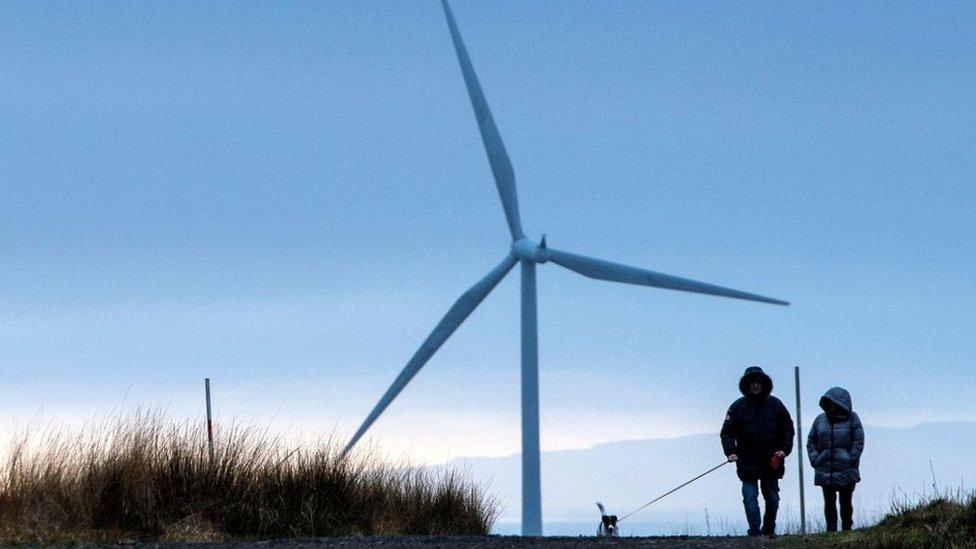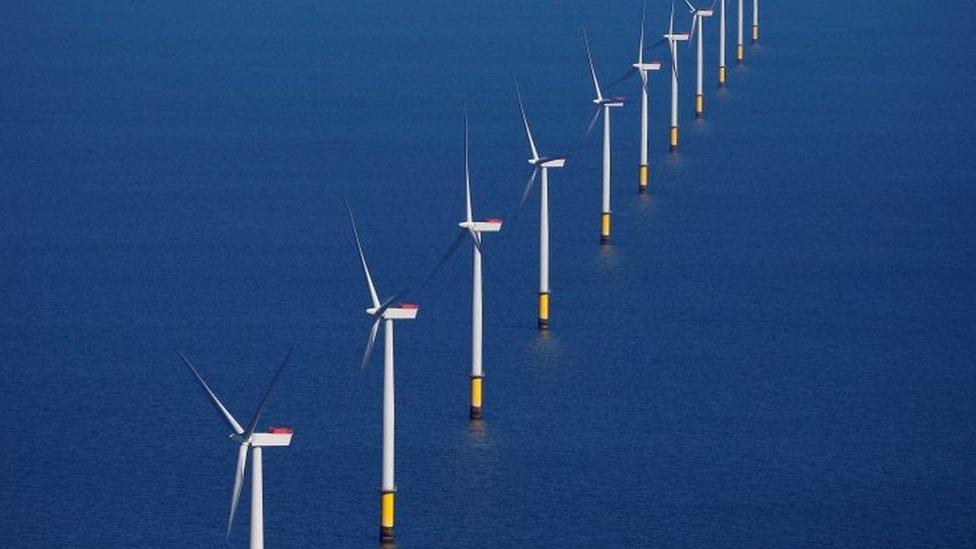Government climate advisers say cut fossil fuels to lower energy bills
- Published

Climate advisers say that renewable power is a more reliable way to lower energy bills
The best way to ease consumers' pain from high energy prices is to stop using fossil fuels rather than drill for more of them, the government's climate advisers say.
Some Tory MPs want the government to expand production of shale and North Sea gas, saying it would lower bills.
But advisers said UK-produced gas would be sold internationally and barely reduce the consumer price.
They said wind and solar power, as well as home insulation, is a better route.
The report from the Climate Change Committee (CCC) comes at a time when household energy bills are rising quickly. There is also international uncertainty over gas supplies due to the Russia-Ukraine crisis.
The committee warned that new fossil fuel projects in the North Sea would, in some cases, not deliver gas until 2050.
That’s the date when climate laws stipulate that the UK must be almost completely weaned off gas.
The committee said it favours tighter restrictions on drilling in the North Sea, and it favours a "presumption against exploration".
But it won’t go so far as recommending these actions to ministers because it said there are finely-balanced arguments for and against drilling.
British-produced gas, for instance, is extracted causing less damage to the climate than imports, although it’s impossible to say whether other exporters will reduce their own emissions in future.
What’s more, a so-called windfall tax might be imposed on the rising profits of oil firms – and the cash given back to consumers.
These uncertainties mean that decisions on whether to drill more in the North Sea must be left to ministers, the committee says.
The oil and gas industry feels it has a strong case because of its lower-than-average emissions.
Environmentalists are angry that the committee hasn’t followed the recommendation of the International Energy Agency (IEA) and ruled out further fossil fuel exploration because enough has been discovered already.
“We think the UK - with its diversified economy and its large historic emissions - should be the ones leading the way on recommending no further oil and gas exploration,” Doug Parr from Greenpeace told BBC News.
Chris Stark, chief executive of the CCC, said the committee was disappointed with the UK oil and gas industry's ambitions to cut its own operational emissions.
What does it take to live on renewable energy?
It said the industry could lower pollution by reducing methane venting and electrifying oil platforms. And it warned that over-supply of hydro-carbons globally would “blow the Paris climate agreement out of the water.”
Lord Deben, the committee’s chairman, was emphatic about the need to continue on the path away from burning gas. He said if the UK followed through with green policies outlined by the prime minister, it would cut £100 off bills in the future.
He said average home bills would have been £40 lower now if the former PM David Cameron hadn’t scrapped schemes to insulate the UK as part of his initiative to “cut the green crap” – a remark ascribed to one of his aides, which led to an assault against energy-saving programmes.
A spokesperson for the Department for Business, Energy and Industrial Strategy (BEIS) welcomed the report as an "acknowledgement that carbon budgets can still be met if new oil and gas fields are developed in the UK".
"There will continue to be ongoing demand for oil and gas over the coming decades as we transition to cleaner and cheaper forms of energy generated in this country," the spokesperson said.
Craig Mackinlay, one of the most vocal MPs calling for increased North Sea drilling, said the CCC advice had "finally acknowledged" that UK "domestic gas production creates jobs, can reduce energy prices and helps towards energy security".
The report comes a day after a think tank, Green Alliance, accused the government of wasting millions of pounds, external on propping up North Sea oil and gas.
"Tax relief and subsidies have made the UK one of the most skewed tax environments in the world for oil, external and gas production," it said.
The report estimated that fossil fuel companies received nearly £10bn in tax relief for new exploration in the North Sea, external between 2016 and 2020, while £3.7bn was granted in tax relief for decommissioning costs.
But the report warned that revenue is expected to drop from the mature basin, as remaining resources become harder to extract.
- Published22 February 2022

- Published9 February 2022
